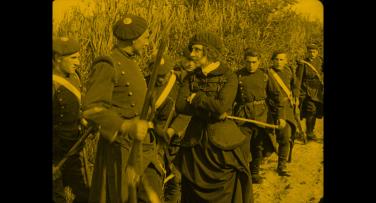
Restoring a film is no easy task. It’s a long, costly process requiring an extraordinary level of expertise. The elements involved often seem to go against the rescue of cinematic heritage from oblivion: the media and emulsions are tragically evanescent, the research requires notable perseverance over time, and efforts to source funds for undertaking such a project can come to nothing. When the historical importance of a film made a century ago is verified on several counts and funding is secured, this is excellent news indeed. And in fact, such a fortunate event is precisely what we are about to discuss.
Pour Don Carlos/La capitana Alegría has been restored by the Cinémathèque de Toulouse, the Cinémathèque Française and the San Francisco Silent Film Festival in collaboration with the Basque Film Archive, among other institutions. This was a 4K restoration conducted by the pioneering laboratories at Hiventy and L’Immagine Ritrovata using a diversity of elements from the Cinémathèque de Toulouse and the Cinémathèque Française, none of which, however, could fill the sizeable gaps. This led to an overall restoration of the film and not just a digital restoration of the parts which were best preserved. The series of choices made sought to uphold the policies and professional ethics of this field. Discussions were had about the initial version of the film being up to three hours long, but this was frankly absurd. Francesca Bozzano, Collections Manager at the Cinémathèque de Toulouse, believes that up to 10 to 20 minutes of footage could be missing, including a prologue that would have provided context.
There is little doubt that Pour Don Carlos was one of the most ambitious films directed by Musidora (Paris, 1889-1957), who in this case adapted the eponymous novel by Pierre Benoit. Historians such as Koldo Larrañaga and Eneko Tuduri believe that this was the first fiction feature film shot in the Basque Country (Hondarribia, Oiartzun, Peñas de Aia, etc.). Either way, the film sheds light on the talent of Musidora, the consummate film maker: director, screenwriter, producer and performer, muse of the surrealists ever since her performance in a vamp role in Louis Feuillade's Les vampires (1915), artist in search of creative freedom who founded the Société des Films Musidora in 1918, tireless collaborator of Henri Langlois at the Cinémathèque Française. She deserves much more recognition for the authorship of the film, despite it also being attributed to Jaime de Lasuen. The latter was a Carlist, seemingly of Basque origin though born in Viareggio (Italy). He helped Pierre Benoit to document the Third Carlist War and was therefore useful to Musidora in terms of finding locations, local collaborators, uniforms, etc. His career as a film maker was limited to his work with Musidora. He was much more prominent as a man of action: decorated by the French army in the First World War, Carlist militiaman in the Spanish Civil War and fighter with the French Resistance in the Second World War, before being tortured to death by the Gestapo in 1944.
The film narrates the adventures of a fervent defender of Don Carlos in late 1875 and early 1876. The ‘Capitana Alegría’ (Captain Joy) wastes no time in seducing, disguising herself, lying and even killing for her ideas or for a great love... Musidora did not need the black silk of the vamp to make her mark as an impassioned film maker.
Joxean Fernández, Director of the Basque Film Archive
Presented by Franck Loiret (Director of the Cinémathèque de Toulouse).
Organizer: Basque Film Archive
Pour Don Carlos/La capitana Alegría has been restored by the Cinémathèque de Toulouse, the Cinémathèque Française and the San Francisco Silent Film Festival in collaboration with the Basque Film Archive, among other institutions.
